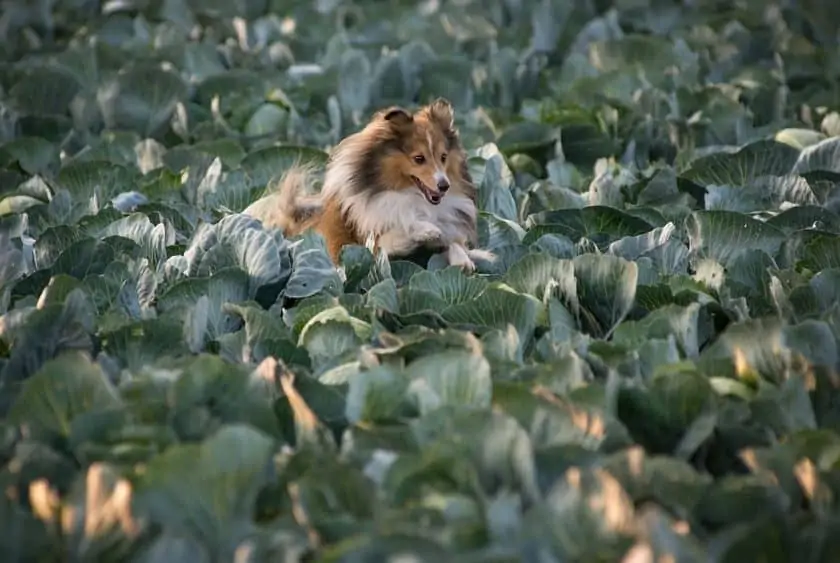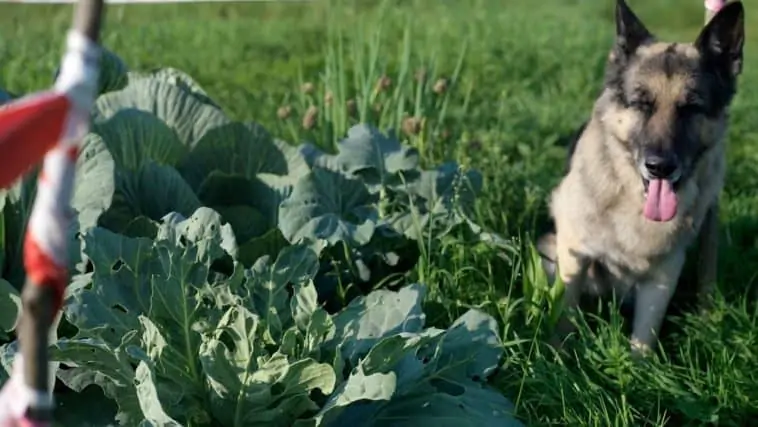Cabbage. This ultra-healthy cruciferous vegetable can be added to multiple recipes and stews. For comfort food, it is certainly one of the best and most healthy, for humans. We all know that we need a healthy balance of fruits and veg in our diets but what about dogs? Can dogs eat cabbage?
Dogs also require healthy vegetables in their diets to provide them with sufficient levels of nutrition and substance without adding too many carbs. But, is the low-cost, easy-to-make, vitamin and nutrient-packed humble cabbage safe to feed to your pup?
Well, today, we are going to find out.
While there are certain vegetables that dogs should avoid, such as mushrooms and onions, cabbages are generally safe for dogs to consume. However, as with all foods, this veggie should only be given to your dog in moderation.
If the balance is right, this leafy green can have numerous benefits on your dog’s health and lifestyle.
Let’s explore the health benefits of cabbages when fed to our furry best friends as well as the potential dangers behind this dense-leaved veggie.
Table of Contents
The health benefits of cabbage for dogs
Leafy greens are a great place to begin if you want to start adding more vegetables to your dog’s diet. The good news is that cabbage is not only safe for your dog to eat but it can be prepared in various ways so your dog can enjoy different kinds of cabbage meals and not get bored.
It can be offered on its own as a healthy treat, served alongside kibble, or even baked and stuffed with other pet-friendly foods.
Cabbage provides dogs with many health benefits. It is a rich source of many important vitamins such as vitamins C, K, B1, and B6. And we can’t forget that it is fully packed with healthy fiber and essential minerals like copper, potassium, and manganese.
While this leafy green can come in a green, red, or white form, it’s red cabbage that is believed to have very strong cancer-fighting properties.
While cabbage is supremely healthy for humans and dogs, our furry friends should still get most of their nutrition from their regular dog food.
However, it doesn’t hurt to feed them healthy human foods such as cabbage now and again. We recommend talking to your veterinarian first to get their expertise on whether your dog can eat cabbage or not.
Cabbage also has high levels of antioxidant compounds known as ‘phytonutrients.’ The polyphenols within cabbage make this the cruciferous vegetable with the most antioxidants.
These powerful antioxidants help support the overall health and immune system of both humans and dogs.
They help reduce free radicals in the bloodstream which helps prevent diseases such as cancer.
As well as boosting the immune system of your pooch, cabbage can reduce the risk of certain diseases developing such as heart disease.
Cabbage consumption has also been shown to promote a healthier gastrointestinal system in our four-legged friends and aids proper digestion due to its high fiber content. Many dogs are known to have issues with their digestive systems but cabbage can sometimes help significantly.
It’s not just beneficial for the internal organs of your dog. Cabbage can also have a positive impact on your pup’s skin and help reduce or even prevent any skin irritation.
Eating cabbage promotes healthier skin, inside and out for humans and dogs. So, if your dog suffers from dry or rough skin, adding cabbage or similar leafy greens could have a hugely beneficial impact on them.
While veggies and fruits can be very healthy for dogs, we mustn’t forget that dogs are naturally carnivorous. Therefore, cabbages and other greens should only be a snack for them to enjoy occasionally. The majority of their diet should still consist of meat.
The potential danger of cabbage for dogs

There is no doubt that cabbage has some great positive effects on dogs. However, side effects can occur. As with humans, if a dog eats too much of this veggie, it can cause symptoms such as excessive gas and flatulence, leading to an upset stomach.
Although this leafy green is healthy for most dogs, it doesn’t mean they can always eat as much as they want.
You should consult your veterinarian before offering cabbage or any new ‘people’ foods to your dog. In general, you will probably be advised to feed small portions of new foods, such as cabbage, to your dog and then monitor them for 24 hours or so.
This is when you should look out for any possible symptoms such as watery stools. If so, it will show that cabbage doesn’t agree with your pooch so it may not be suitable to add to their diet.
If your dog eats too much raw cabbage, it can cause hypothyroidism. However, this would mean your dog has eaten vast quantities of cabbage over continuous, multiple days. In other words, this is extremely rare.
Cabbage contains thiocyanate, a natural compound that can affect the thyroid gland. Nonetheless, you can remove this dangerous compound from cabbage by thoroughly cooking the cabbage (boiling or steam) before feeding it to your dog.
While dogs can eat all colors and forms of cabbage in moderation, you should always cook it first.
This makes it easier for your pup to chew and digest it and also provides a layer of protection from the very small risk of hypothyroidism.
And, whether you’re preparing Napa, purple, red, green, Savoy, or any type of cabbage, never mix them with spices, seasonings, or other additives that may not be dog-friendly.
While humans like a pinch of salt or spice to add flavor to cabbage, dogs generally enjoy the bland natural taste.
In Summary
So, dogs can eat cabbage but it shouldn’t be a substitute for their main dog food. Its nutritious value has heaps of benefits for your four-pawed buddy improving their health as well as their immune system. It can even help fight off cancer.
This all makes cabbage a great ingredient for adding to your dog’s diet on certain occasions.

